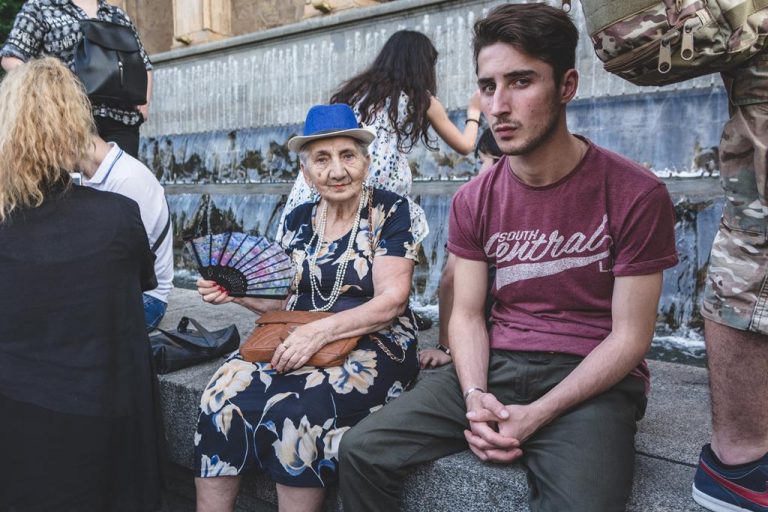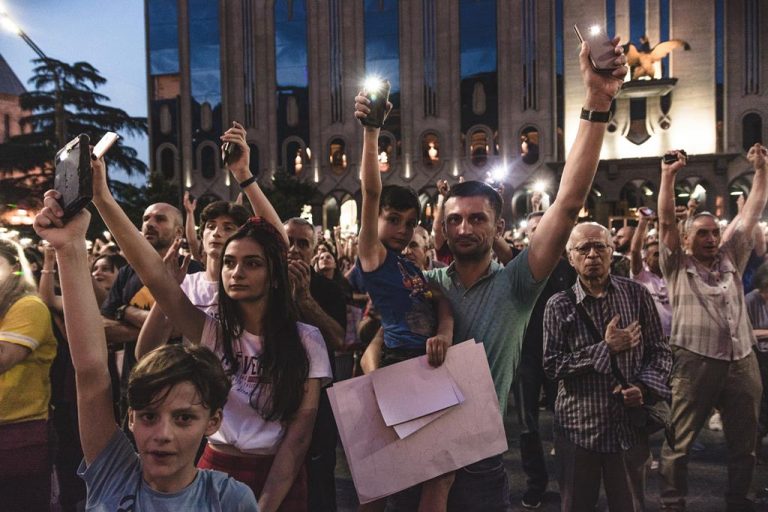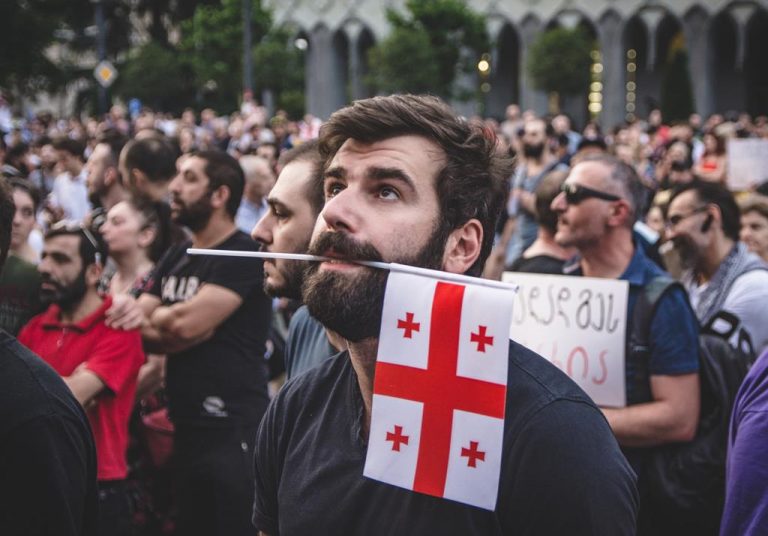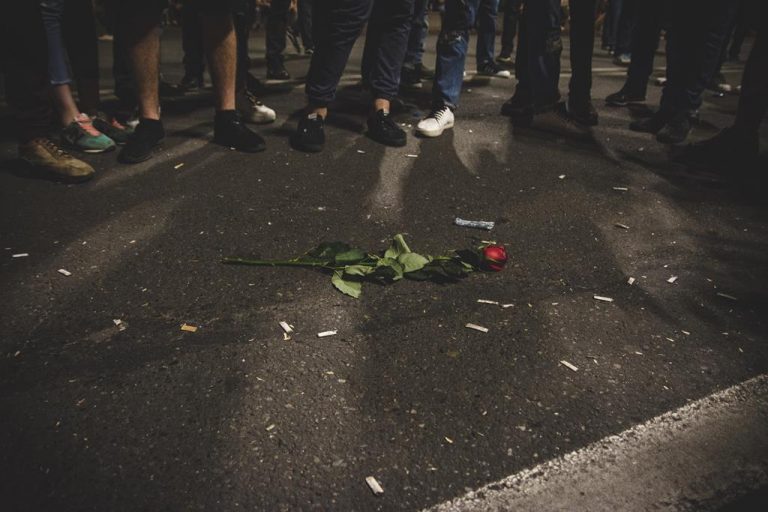“I will never forgive this government for the lost eyes and savagery that we saw on June 20th” – a photo essay from the ongoing protests in Tbilisi5 min read
“What is it all for?” the old lady grabs my hand and squeezes it desperately, waiting for some wise answer.
“Why?” she repeats, emphasizing her question with a gesture towards a square full of people gathering for the second day of protest on Rustaveli Avenue, in front of the Parliament in Tbilisi.
“I don’t know, why are you here?”
“How could I not be…. Did you see what happened yesterday?! What kind of government shoots their own citizens? What kind of people are they? They shot at on kids, the young, the old, everyone, just ordinary people who came to the streets. I can’t pretend I didn’t see it.”
Tbilisi has been protesting since June 20th, 2019. On this day Russian State Duma Deputy Sergei Gavrilov spoke to Georgia’s Parliament from the speaker’s seat during the Interparliamentary Assembly on Orthodoxy (IAO). These proceedings enraged Georgian citizens and launched a spontaneous rally to protest Russian influence in Georgia.

On the first day of the protest, opposition politician Nika Meliaof from the United National Movement (UNM) encouraged the crowd to storm the Parliament. This caused clashes between the protesters and the police. More than 240 people were hurt, and 300 detained. The use of tear gas and rubber bullets shocked Georgian society and brought more than 10,000 people to the streets the next day.

“I joined this protest to show my anger for the unimaginable brutality displayed by the riot police. I will never forgive this government the lost eyes and savagery that we saw on June 20th.” Lasha, 22 and a student of international relations told me as I joined the protesters in front of the parliament.




The red eye patch with ‘20%’ written on it is the protesters’ symbol. It refers to what has been recognised by a majority of the international community as a Russian military occupation of the two break-away republics South Ossetia and Abkhazia (which together constitute 20% of Georgia’s territory) and is a sign of solidarity with two people who lost an eye in clashes with riot police.


Although the protest was called “unpolitical,” some citizens believe it may be exploited by opposition parties.
“I don’t want a revolution. I’ve already seen one. We don’t have any alternative nowadays. UNM is not an alternative.” Ekuna, a 25 year old youth worker, told me.

Mariam, 24, is an activist. She didn’t join the protests at parliament. Instead she has joined an alternative student protest in front of Tbilisi State University. “Lots of my friends were in front of the parliament building and I wanted to force myself and go there as well, but political reasons stopped me. [The protest] was purely led by the opposition party, UNM, which I think is a really immoral actor, and I just did not want to be connected with them in any way.”



Lasha: “I was afraid that a real protest by ordinary people might be used by politicians for their own aims and agendas, which would mostly delegitimize the demonstration in the eyes of society. But fortunately, we the people managed to keep corrupt politicians away from taking over the protest and kept its authentic character .”



“Of course you can see politicians in the crowd” a professor from the University of Georgia told me on the fourth day of the protest. “I can recognize them easily. Mostly politicians from the opposition – from UNM, European Georgia and Girchi. You see this big, bold guy in a pink t-shirt? He is one of the most prominent politicians from UNM, accused of torturing and killing people when his party was in power. Even today if you’re Georgian and you see him you get scared, it is subconscious. But we can’t give up. My students are here and I see them watching the speakers carefully. Any political statements are nipped in the bud.”


Many of the most frequently-heard slogans at the protests are against Putin, Russian influence in Georgia, and the oligarchs, whose economic ties with Russia are strong. While the protests have been ongoing, Russia has cancelled all flights from Russia to Georgia beginning on the 8th of July, and has begun convincing its citizens to cancel their holiday plans in Georgia for safety reasons. Putins’ Press Secretary Dmitry Peskov called the protests “Russophobic provocations”.

Mariam: “I see myself as a victim of Russian politics. The “border line” resulting from the war in 2008 crosses my village now, my relatives are internally displaced people, and I knew people who died in that war. But in the protests we hear only about territories of Abkhazia and South Ossetia and boundaries problems. My protest against Russia is more complex and my demands refer to the Georgian Government. I would like the Russian occupation to be reflected in social and economic policies. Most of the businesses in Georgia are led by Russians”

Lasha: “These protests are not against people, but against corrupt and authoritarian regimes, violence, intimidation against freedom of speech and individual and political liberties. Against everything that Putin’s criminal regime stands on.”

Lasha: “As I was going to join the demonstration on the second day, I met dozens of Russian tourists having a late dinner some 200 meters from the protest site, and dozens of Russians were strolling and enjoying the Tbilisi night, as protesters were going home. So any information about anti-Russian tension is completely false and part of the Kremlin propaganda machine.”



The protest had three clear goals – 1) the resignation of Minister of Internal Affairs Giorgi Gakharia, 2) the release of every person who was, for no reason, unlawfully sent to prison after the demonstrations on June 20th just because they were protesting and 3) the implementation of proportionate election system for the upcoming 2020 parliamentary elections Lasha told me.
So far protesters have achieved the implementation of a proportionate election system with a 0% threshold in 2020. Irakli Kobakhidze, speaker of the Georgian Parliament, has resigned. An investigation into the events of June 20th has been launched. Ten law enforcement officers have been suspended from duty due to possible abuse of power during the June 20-21st rally in central Tbilisi. The Prosecutor’s Office of Georgia has also urged the public to help the investigation and provide footage which may show abuse of power during the demonstration. Giorgi Gakharia remains in his position.
The protest in Tbilisi continues.




